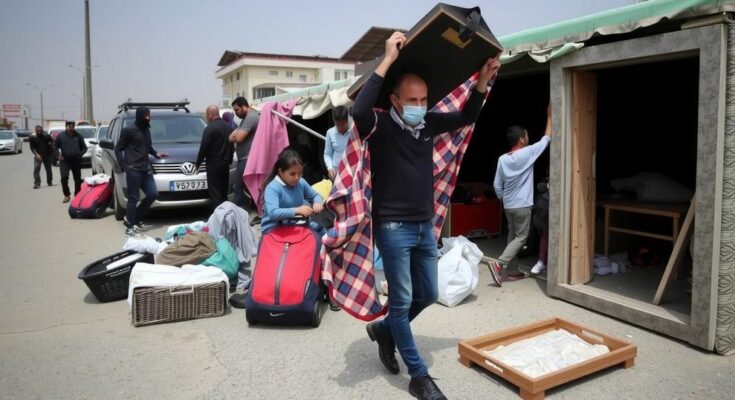The conflict in Lebanon has stranded approximately 177,000 migrant workers, primarily women from Africa and Asia, as their employers evacuated amid violence. Workers face abandonment, homelessness, and threats, exacerbated by the kafala system. Community organizations are providing assistance, yet the crisis continues to escalate, leaving many without support.
The ongoing conflict in Lebanon has particularly impacted the approximately 177,000 migrant workers, predominantly women from Africa and Asia, who now find themselves in a vulnerable position. As employers abandon them amid escalating violence, these workers are left without support or resources. One striking example is Lina, a 29-year-old Kenyan housekeeper isolated in her apartment since her employers fled.
The situation highlights a broader crisis where the exploitative kafala system binds migrants’ legal status to their employers, often leading to situations of abuse and exploitation. As Lebanese citizens evacuate, migrant workers face dire conditions, with many forced to sleep on the streets due to overcrowded shelters, exposing them to violence and discrimination. Reports emphasize the distinct dangers women face in such settings.
Community organizations, notably Egna Legna, are actively providing much-needed assistance. Founder Banchi Yimer reported that over a thousand abandoned migrant workers have been documented in just a few days, underscoring the urgency of the crisis. However, these efforts face significant obstacles, such as limited resources from embassies and soaring evacuation flight costs, which have now doubled. Consequently, many migrants continue to be stranded without realistic pathways to safety.
The Kenyan government has cautioned against travel to Lebanon due to the absence of formal labor agreements, yet the warning offers little solace to current workers who are trapped in precarious conditions. Vionnah Kerubo, another Kenyan domestic worker, reflects the despair of many as her employer has refused to release her, leaving her to navigate a perilous environment exacerbated by the ongoing violence. The emotional toll mirrors that experienced during the COVID-19 pandemic when numerous migrant workers were similarly abandoned without options.
In summary, the plight of migrant workers in Lebanon, particularly women, is grave. With inadequate support from their respective governments, they often depend on each other for assistance and survival in these tumultuous times.
The ongoing crisis in Lebanon, intensified by recent military conflicts, has resulted in a significant number of migrant workers being stranded. The kafala system, a sponsorship-based labor model, subjects migrant workers to severe restrictions and abuse, complicating their ability to escape dangerous situations. Many workers, predominantly from African and Asian nations, are now facing homelessness and peril, as they are abandoned by their employers amid violence, leading to calls for urgent intervention and support from community organizations and consulates.
The crisis in Lebanon has left thousands of migrant workers in precarious situations, facing abandonment and danger as employers flee violent conflicts. With the exploitative kafala system restricting their rights, many are left without recourse to safety. Community organizations are stepping up to provide urgent support, but the scale of the challenge is overwhelming, highlighting the need for a concerted international response to protect vulnerable workers in crisis situations.
Original Source: www.mwakilishi.com




